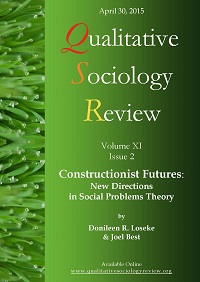Regulating Pornocomic Sales to Juveniles in Japan: Cycles and Path-Dependence of a Social Problem
DOI:
https://doi.org/10.18778/1733-8077.11.2.05Keywords:
Path-Dependence, Social Problems, Pornocomics, Youth Protection Ordinance, TokyoAbstract
The purpose of this paper is to develop a new constructionist perspective on path-dependence of a social problem by examining the process of constructing issues regarding the revisions of the Tokyo Youth Protection Ordinance from December 2008 to July 2010. I start with pointing out that a social problem has a cycle of concern and a unique past and background, in a word, path-dependence. Once a social problem process has started down a track, the costs of reversal are very high. Through investigating the revision process between pro-regulation and anti-regulation groups compared with the previous arguments, I found three characteristics of arguments: the limited use of statistics, shared grounds, and shared warrants. I interpret the features as an unintended consequence of path-dependence of the pornocomic problem. This context limits the course of claims-making activities and affects the following controversy. I conclude that the concept of path-dependence offers a better understanding of how and why claims-making activities sometimes lose their diversity and are lopsided over time.
Downloads
References
Akagawa, Manabu. 1993. “Controversy Over Difference: Modernity, Childhood, and Pornography [差異をめぐる闘争: 近代、 子ども、ポルノグラフィー].” Pp. 163-200 in Rhetoric of Children [子どもと いうレトリック], edited by Nakagawa Nobutoshi and Nagai Yoshikazu. Tokyo: Seikyusha (青弓社).
Google Scholar
Akagawa, Manabu. 2012. Sociology of Social Problems [社会問題 の社会学]. Tokyo: Kobundo (弘文堂).
Google Scholar
Best, Joel. 1990. Threatened Children: Rhetoric and Concern About Child-Victims. Chicago: University of Chicago Press.
Google Scholar
Best, Joel. 2008. Social Problems. New York: W.W. Norton Company.
Google Scholar
Fukushima, Akira. 1990. Comics and Japan [マンガと日本人]. Tokyo: Nihonbungeisha.
Google Scholar
Goodman, Roger, Yuki Imoto, and Tuukka Toivonen. 2012. A Sociology of Japanese Youth: From Returnees to NEETs. London: Routledge.
Google Scholar
DOI: https://doi.org/10.4324/9780203802076
Ibarra, Peter R. and John I. Kitsuse. 1993. “Vernacular Constituents of Moral Discourse: An Interactionist Proposal for the Study of Social Problems.” Pp. 25-58 in Reconsidering Social Constructionism: Debates in Social Problems Theory, edited by James A. Holstein and Gale Miller. New York: Aldine de Gruyter.
Google Scholar
DOI: https://doi.org/10.4324/9781315128153-2
Japan Book Publisher Association. 2009. “Comment on the Draft Report [第28期東京都青少年問題協議会答申素案「メディア社会が拡がる中での青少年の健全育成について」への意見].” Retrieved January 18, 2015 http://www.jbpa.or.jp/pdf/documents/seishokyo2009.pdf
Google Scholar
Kinsella, Sharon. 2012. “Statistics and Narratives: How Compensated Dating Was Sold.” Pp. 54-80 in A Sociology of Japanese Youth: From Returnees to NEETs, edited by R. Goodman, Y. Imoto, and T. Toivonen. London: Routledge.
Google Scholar
Levi, Margaret. 1997. “A Model, a Method, and a Map: Rational Choice in Comparative and Historical Analysis.” Pp. 19-41 in Comparative Politics: Rationality, Culture, and Structure, edited by Mark I. Lichbach and Alan S. Zuckerman. Cambridge: Cambridge University Press.
Google Scholar
Nagayama, Kaoru and Takashi Hiruma, (eds.). 2010. Manga Debate 3.0 [マンガ論争 3.0]. Tokyo: Nagayama Kaoru Office (永山薫事務所).
Google Scholar
Nakagawa, Nobutoshi. 1999. Sociology of Social Problems [社会問題の社会学]. Tokyo: Sekaishisosha (世界思想社).
Google Scholar
Pierson, Paul. 2000. “Increasing Returns, Path Dependence, and the Study of Politics.” American Political Science Review 94(2):251-267.
Google Scholar
DOI: https://doi.org/10.2307/2586011
Pierson, Paul. 2004. Politics in Time: History, Institutions, and Social Analysis. New Jersey: Princeton University Press.
Google Scholar
DOI: https://doi.org/10.1515/9781400841080
Sato, Toshiaki. 2012. Rhetorical Analysis of Rejection of the Revised Bill of the Ordinance for Raising Sound Children in Tokyo on June 2010 [東京都青少年条例改正案『2010年6月・否決』のレトリック分析]. Graduation Thesis of Faculty of Letters, University of Tokyo, Japan.
Google Scholar
Suzuki, Tadashi. 2001. “Frame Diffusion From the U.S. to Japan: Japanese Arguments Against Pornocomics, 1989-1992.” Pp. 129-145 in How Claims Spread: Cross-National Diffusion of Social Problems, edited by Joel Best. New York: Aldine de Gruyter.
Google Scholar
The 28th Tokyo Youth Affairs Conference. 2009. A Draft Report on the Issue of Raising Sound Juveniles in a Computer Mediated Society [メディア社会が拡がる中での青少年の健全育成について答申(素案)]. Retrieved February 02, 2015 http://www.metro.tokyo.jp/INET/BOSHU/2009/11/DATA/22jbq201.pdf
Google Scholar
Tokyo Metropolitan Assembly. 1992. The Tokyo Juvenile Sound Upbringing Ordinance [東京都青少年の健全な育成に関する条例]. Retrieved February 06, 2015 http://www.reiki.metro.tokyo.jp/reiki_honbun/g1012150001.html
Google Scholar
Yamamoto, Isao. 2000. “Legislation on Sexual Misconduct in Tokyo and the Rhetoric of Victimization.” Journal of Japanese Criminology 25:49-66.
Google Scholar
Downloads
Published
How to Cite
Issue
Section
License

This work is licensed under a Creative Commons Attribution-NonCommercial-NoDerivatives 4.0 International License.











